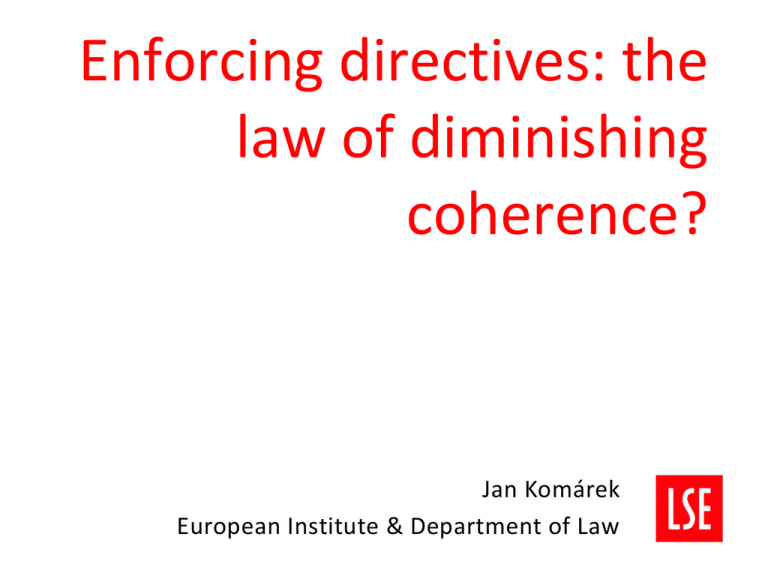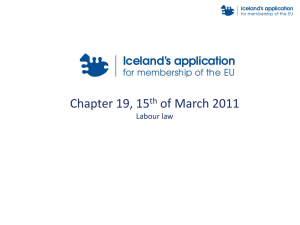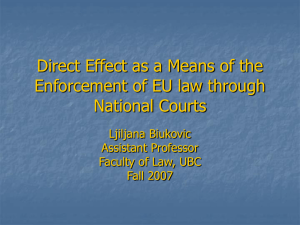Enforcing directives: the law of diminishing coherence? EUROPEAN
advertisement

Enforcing directives: the
law of diminishing
coherence?
Jan Komárek
European Institute & Department of Law
Legal effects of directives
Art. 288, third subparagraph TFEU:
'A directive shall be binding, as to the result to be
achieved, upon each Member State to which it is
addressed, but shall leave to the national authorities the
choice of form and methods'.
can any provision of a directive be ever directly effective?
Case 41/74 Van Duyn
a Dutch national refused entry into the UK (she was a
member of the Church of Scientology)
Directive 64/221 on the coordination of special measures
concerning the movement and residence of foreign
nationals which are justified on grounds of public policy,
public security or public health
the ECJ:
binding effect of directives
rejection of "contrary to" (regulations) argument
useful effect of directives
argument with reference to preliminary ruling procedure
Unwelcoming reaction
Conseil d'Etat, 1978, the Cohn-Bendit Case:
'... whatever the detail that [directives] contain for the
eyes of the Member-States, [they] may not be invoked by
the nationals of such States in support of an action
brought against an individual administrative act'.
this case law eventually abandoned only in 2009,
Emmanuelle Perreux Case
Elaborating on the reasons
the "estoppel argument" - Case 148/78 Ratti
a company complying with labelling requirements of a
directive not yet implemented in Italy; law in force
imposing more stringent requirements – criminal
prosecution
'a Member State which has not adopted the
implementing measures required by the directive in the
prescribed periods may not rely, as against individuals,
on its own failure to perform the obligations which the
directive entails' (para. 22).
Conditions
the provision in question must be 'unconditional and
sufficiently precise'
the period for implementation must have expired –
BUT...
against whom? ...
Imposing obligations on individuals?
the logic the 'estoppel argument'
Case 152/84 Marshall:
Directive 76/207 on the implementation of the principle of
equal treatment for men and women as regards access to
employment, vocational training and promotion, and
working conditions
different retirement age
Southampton and South-West Hampshire Area Health
Authority
Marshall
the ruling and its consequences
'It must be emphasized that according to Article 189 of
the EEC Treaty the binding nature of a directive, which
constitutes the basis for the possibility of relying on the
directive before a national court, exists only in relation to
‘each member state to which it is addressed’. It follows
that a directive may not of itself impose obligations on an
individual and that a provision of a directive may not be
relied upon as such against such a person' (para. 48).
no "inverse" vertical direct effect
no horizontal direct effect ... OR?
DEBATE
Shall the ECJ maintain
the prohibition on
horizontal direct effect
of directives?
Overcoming the limitations
what is a state?
'incidental' direct effect and 'triangular situations'
member state liability
consistent interpretation ('indirect effect')
An extensive definition of the State
Marshall:
'where a person involved in legal proceedings is able to rely on a
directive as against the State he may do so regardless of the
capacity in which the latter is acting, whether employer or public
authority. In either case it is necessary to prevent the State from
taking advantage of its own failure to comply with Community
law' (para. 49).
C-188/89 Foster:
compulsory retirement age, 60 women, 65 men
respondent: British Gas - a private company, but...:
monopoly of gas supply in Britain,
members appointed by Secretary of State,
directions from the government,
regular reports...
Foster
a body,
whatever its legal form,
which has been made responsible for providing a
public service under the control of the State
pursuant to a measure adopted by the State
has for that purpose special powers beyond those
which result from the normal rules applicable in
relations between individuals
is included in any event among the bodies against which
the provisions of a directive capable of having direct
effect may be relied upon
'Incidental' horizontal direct effect
C-194/94 CIA
a 'procedural directive' (83/189) – notification of national
technical standards
CIA suing competing companies for libel (that its security
systems do not comply with Belgian legislation)
defendants' counterclaims: CIA indeed did not comply
CIA
'...it is undisputed that the aim of the directive is to
protect freedom of movement for goods by means of
preventive control and that the obligation to notify is
essential for achieving such Community control. The
effectiveness of Community control will be that much
greater if the directive is interpreted as meaning that
breach of the obligation to notify constitutes a
substantial procedural defect such as to render the
technical regulations in question inapplicable to
individuals'.
How far?
C-443/98 Unilever Italia:
parties to a contract on the supply of wine; one of the
conditions stipulated that it must comply with the rules in
force in the state of import
labelling indicating the geographical origin of the various
kinds of olive oil
supplier did not comply, retailer refused to pay
C-226/97 Lemmens:
breath-analysis apparatus used by the Police in the NED
distinction between a 'hindering of the use or marketing of
a product' and its 'any use'
Triangular situations
C-201/02 Wells - development consent granted in breach
of requirements of the EIA directive
'...the principle of legal certainty prevents directives from
creating obligations for individuals. For them, the provisions
of a directive can only create rights ... Consequently, an
individual may not rely on a directive against a Member State
where it is a matter of a State obligation directly linked to the
performance of another obligation falling, pursuant to that
directive, on a third party.
On the other hand, mere adverse repercussions on the rights
of third parties, even if the repercussions are certain, do not
justify preventing an individual from invoking the provisions of
a directive against the Member State concerned...' (paras. 56
and 57).
Member State liability
Joined Cases C-6/90 and C-9/90 Francovich and Others v
Italy
Joined Cases C-46 and C-48/93 Brasserie de
Pêcherur/Factortame III
Case C-91/92 Facchini Dori
language correspondence course, impossibility to
renounce it in line with consumers protection directive
no horizontal direct effect – liability
an 'easy' way out? - who pays, in the end?
Interpretation in conformity with a
directive
many different names:
indirect effect,
concurring or concurrent interpretation,
loyal interpretation,
harmonious interpretation,
benevolent interpretation,
conciliatory interpretation,
consistent interpretation,
interpretative obligation,
principle of purposive interpretation,
Von Colson principle,
uniform interpretation,
‘invocabilité d’interprétation’
Case 14/83 Von Colson
Directive 76/207 - equal treatment for men and women
as regard access to employment, vocational training and
promotion, and working conditions
female job applicants (social workers) – prison; not
allowed to the main proceedings
relevant provision of the German law: 'damages in
respect of the loss incurred by the worker as a result of
his reliance on the expectation that the establishment of
the employment relationship would not be precluded by
such a breach [of the principle of equal treatment]'
The questions
On the relevant sanction:
Is it possible to infer from the Directive any sanction in
the event of discrimination other than the right to the
conclusion of a contract of employment?
Is it enforceable befora national courts?:
Can the Directive, as properly interpreted, be relied on
before national courts by persons who have suffered
injury?
(para. 21)
The sanction
'Although Directive No 76/207/EEC, for the purpose of
imposing a sanction for the breach of the prohibition of
discrimination, leaves the Member States free to choose
between the different solutions suitable for achieving its
objective, it nevertheless requires that if a Member State
chooses to penalize breaches of that prohibition by the
award of compensation, then in order to ensure that it is
effective and that it has a deterrent effect, that
compensation must in any event be adequate in relation to
the damage sustained and must therefore amount to more
than purely nominal compensation such as, for example,
the reimbursement only of the expenses incurred in
connection with the application' (para. 28).
The principle
'It is for the national court to interpret and apply the
legislation adopted for the implementation of the directive
in conformity with the requirements of Community law, in
so far as it is given discretion to do so under national law'
(para. 28).
the referring court granted 6-month salary to the
applicants
A wider context
'adventurous'? compare to the Princess Soraya judgment
of the BVerfG (14. 2. 1973):
according to § 253 BGB no money damages could be
recovered for an injury to non-pecuniary interests – such
as violations of the right to private life
'occasionally, the law can be found outside the positive
legal rules erected by the state; this is law which emanates
from the entire constitutional order and which has as its
purpose the 'correction' of written law. It is for the judge
to ‘discover’ this law and through his opinions give it
concrete effect. The Constitution does not restrict judges
to apply statutes in their literary sense when deciding
cases put before them'.
Pfeiffer – the facts and issues
minumum working hours (directive 93/104)
German Red Cross emergency workers
calculation of working time – is "duty time" to be
included?
German legislation: does not qualify "duty time" as
working time
if so, applicant entitled to the salary at an overtime rate
but: Red Cross – a private party
Pfeiffer
'when it applies domestic law, and in particular legislative
provisions specifically adopted for the purpose of
implementing the requirements of a directive, the national
court is bound to interpret national law, so far as possible,
in the light of the wording and the purpose of the directive
concerned in order to achieve the result sought by the
directive and consequently comply with the third
paragraph of Article 249 EC [now Article 288 TFEU]'
Pfeiffer
'Although the principle that national law must be
interpreted in conformity with Community law concerns
chiefly domestic provisions enacted in order to implement
the directive in question, it does not entail an
interpretation merely of those provisions but requires the
national court to consider national law as a whole in order
to assess to what extent it may be applied so as not to
produce a result contrary to that sought by the directive'.
Pfeiffer
'In that context, if the application of interpretative methods
recognised by national law enables, in certain
circumstances, a provision of domestic law to be construed
in such a way as to avoid conflict with another rule of
domestic law or the scope of that provision to be restricted
to that end by applying it only in so far as it is compatible
with the rule concerned, the national court is bound to use
those methods in order to achieve the result sought by the
directive'.
The methods of interpretation
'interpretative methods recognised by national law'
no contra legem interpretation – C-268/06 Impact
'express prohibition of retrospective application of the
rules in question (concerning fixed-term contracts
concluded before the implementing legislation's entry
into force)'
Since when?
C-212/04 Adeneler - fixed-term contracts,
entered into before the deadline for implementation of
the relevant directive, but after it entered into force
when: publication in OJ or expiry of the period for
implementation or actual implementation?
Adeneler
directive binding on all national authorities, including
courts
directive 'produces legal effects for a MS' – what does
this mean?
'during the period prescribed for transposition of a
directive, the Member States to which it is addressed
must refrain from taking any measures liable seriously to
compromise the attainment of the result prescribed by it'
'from the date upon which a directive has entered into
force, the courts of the Member States must refrain as
far as possible from interpreting domestic law in a
manner which might seriously compromise, after the
period for transposition has expired, attainment of the
objective pursued by that directive'
DEBATE
Are there any
meaningful limits to the
requirements to
interpret domestic law
in conformity with EU
law?
Reducing direct effect to absurdity?
C-144/04 Mangold
Directives 1999/70 [fixed-term contracts] and 2000/78
[equal treatment in employment and occupation]
GER: fixed-term contracts for persons older than 58 (52)
Mr. Mangold's contract concluded before Germany was
obliged to implement the Directive (temporary derogation)
two obstacles to the Directive's effect in the case:
the time
horizontal situation
Mangold
'Directive 2000/78 does not itself lay down the principle
of equal treatment in the field of employment and
occupation'
the period for implementation irrelevant
horizontal application, at least in the sense of setting
aside ('exclusionary' direct effect)
Dejà vu? The unwelcoming reaction to
Mangold
Roman Herzog and Lüder Gerken, "Stop the European
Court of Justice" (FAZ)
AG Mazák in C-401/05 Palacios de la Villa
Editorial in Common Market Law Review: 'Horizontal
direct effect – A law of diminishing coherence?'
The Honeywell Case pending before the BVerfG
meanwhile in Luxembourg...
Case C-227/04 P Lindorfer v. Council
C 427/06 Bartsch
Direct effect of general principles
C-555/07 Kücükdeveci
a bold confirmation of Mangold
but, relevance of the underlying directive and the period
for its implementation (para. 25)
"the general principle of European Union law prohibiting
all discrimination on grounds of age, as given expression in
Directive 2000/78"
how about other principles? - C-378/08 ERG and Others
environmental principles (Art. 174 (2) TEC, now 191 (2) TFEU)
Directive 2004/35 [environmental liability] and "polluter pays
principle"
"the provision is confined to defining the general environmental
objectives of the Community"
The Honeywell Case
BVerfG, judgment of 6 July 2010, Case 2 BvR 2661/06:
'Ultra vires review may only be exercised in a manner which is
open towards European law' (para. 58).
'A sufficiently qualified breach by the Court of Justice of the
principle of conferral cannot be ascertained. Neither the
opening of the field of application of Directive 2000/78/EC to
cover cases which were to particularly attain the objective of the
vocational integration of long-term unemployed older workers,
nor the advance effect of Directive 2000/78/EC, which was yet
to be transposed in Germany, presumed by the Court of Justice,
nor the derivation of a general principle of the prohibition of
discrimination based on age, led to a structurally significant shift
to the detriment of Member State competences' (para. 71).
Germany to be liable to its citizens? (paras. 85-86)
DEBATE
Which approach do you
prefer: Dougan's "trigger
model" or Lenaerts's
"primacy approach"?









